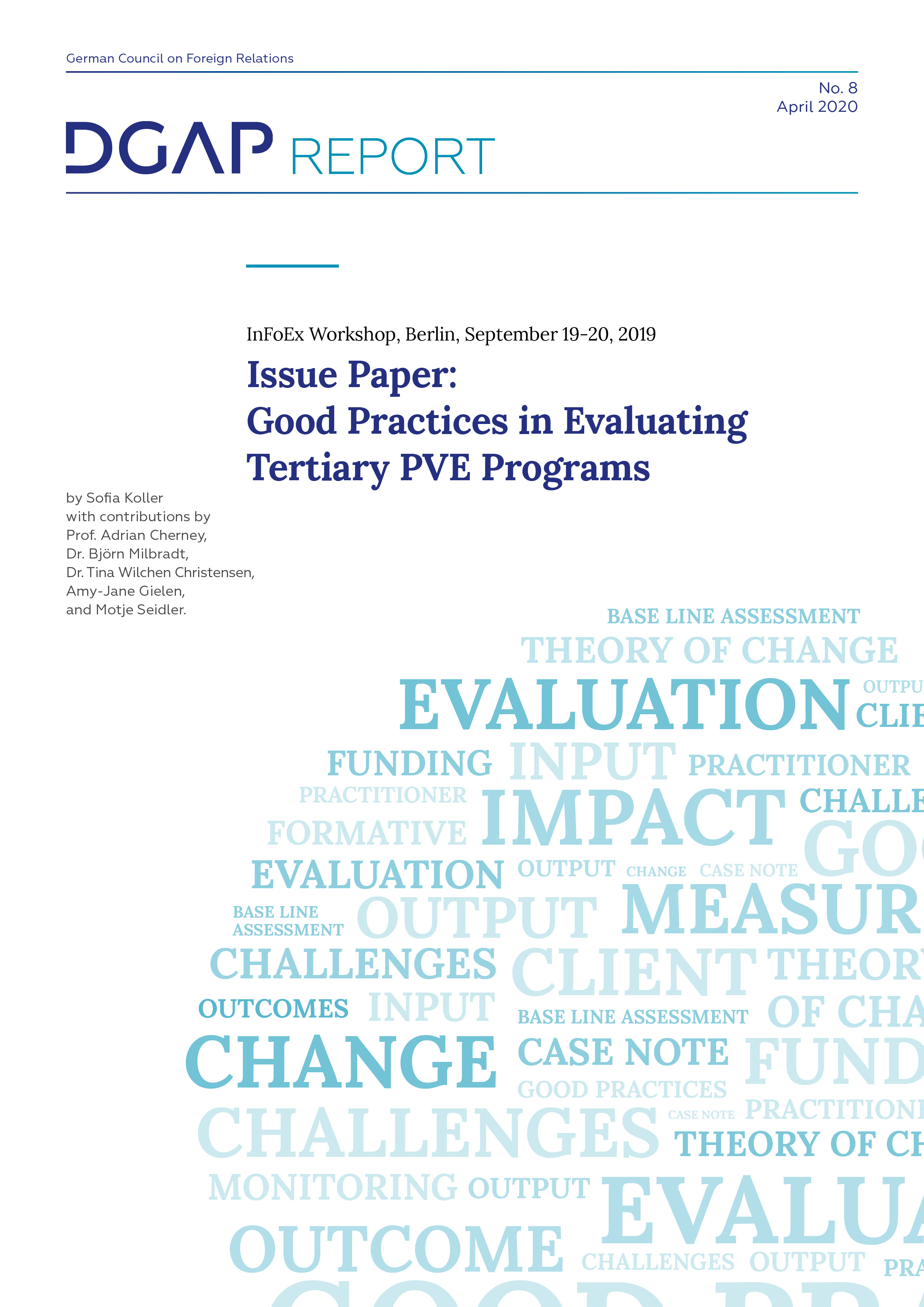As part of the International Forum for Expert Exchange on Countering Islamist Extremism (InFoEx), an international workshop in September 2019 in Berlin addressed the issue of evaluating tertiary prevention of violent extremism, namely measures contributing to the disengagement, deradicalization, and rehabilitation of radicalized individuals. This Issue Paper presents the outcome of this exchange which was organized by the German Council on Foreign Relations (DGAP) in cooperation with the Federal Office for Migration and Refugees (BAMF). The workshop brought together some 30 participants from Australia, Denmark, Germany, the Netherlands, and the United States to discuss experiences, lessons learned, and inspiring practices on evaluation. After providing examples of how tertiary PVE programs in different countries have been evaluated, the paper presents challenges identified and good practices highlighted during international expert discussions. It also includes practical recommendations by international experts in the field.
From these findings, the following key recommendations result for those involved in the design, planning, funding, and implementation of evaluations of tertiary PVE projects and programs in Germany and abroad:
Key Recommendations
| 1) Establish a culture of evaluation among practitioners and funding institutions by including an evaluation perspective from the beginning, integrating it into the program’s design, and providing opportunities to speak about what works and what does not. |
| 2) Consider using a participatory evaluation design and include multiple perspectives as well as ensure a climate of trust between practitioners and researchers so that they can communicate openly and at eye level. |
| 3) Provide long term funding and ensure sustainability for tertiary PVE programs and projects to help build relationships of trust with the concerned individuals. This will make it possible for evaluations to include a significantly delayed second round of interviews with clients and stakeholders. |
| 4) Provide opportunities for (further) professionalization of both practitioners and evaluators regarding challenges when evaluating tertiary PVE programs, projects, and measures. |
| 5) Ensure an intensified and structured exchange of good practices, relevant research, and policy responses between actors involved in evaluation, for example through national and international workshops and round tables. |
About the Project International Forum for Expert Exchange on Countering Islamist Extremism (InFoEx)
InFoEx is a joint project of the Migration, Integration, and Asylum Research Centre of the Federal Office for Migration and Refugees (BAMF) and the German Council on Foreign Relations (DGAP). Over the course of 2019 – 2020, InFoEx is collecting inspiring practices from practitioners working in tertiary prevention in Germany and abroad, as well as insights from academics conducting research in this field.
It is the project’s objective to identify and generate empirical findings on processes of (de)radicalization, with a focus on their practical applicability for deradicalization efforts. To this end, the BAMF Research Centre initiated a consortium of research fellows who are embedded at local advice centers that work together with the BAMF Advice Centre on Radicalisation and various research institutions partnering with the BAMF Research Centre. These research fellows, along with the counselors working at the local advice centers, constitute the core stakeholders of InFoEx.
About the workshop in Berlin, September 19-20, 2019
Among the 30 participants were network partners of the BAMF Advice Centre on Radicalisation from civil society and government institutions, as well as practitioners and academics from Australia, Denmark, Germany, the Netherlands, and the United States. To align the workshop with the needs of its stakeholders, research fellows embedded at local advice centers in Germany shared – in agreement with practitioners at their local advice centers – specific information needs and questions regarding counseling work in tertiary prevention prior to the workshop.


